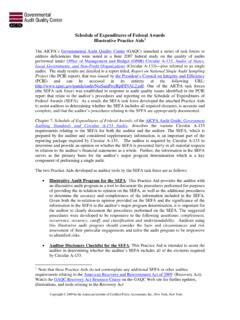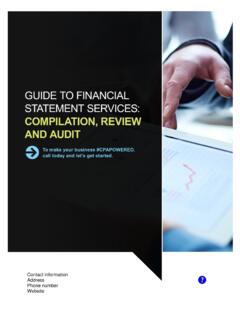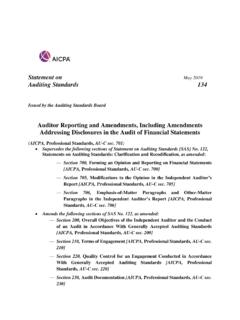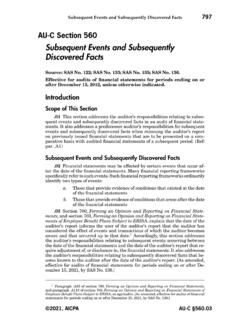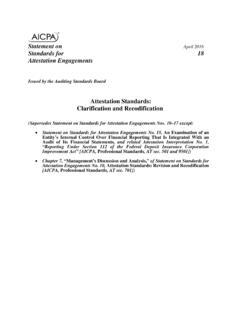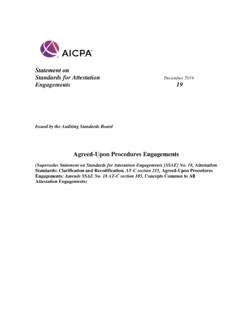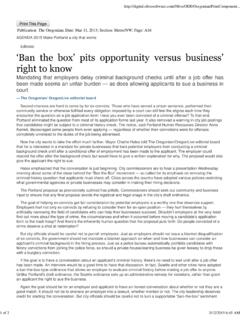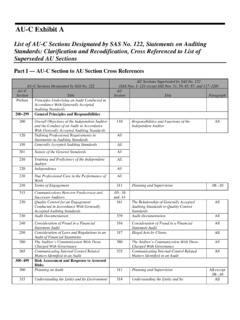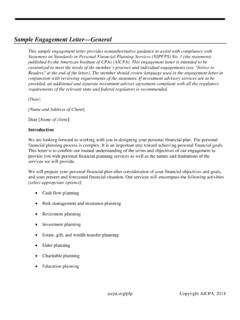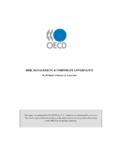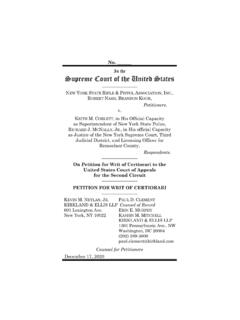Transcription of Exhibit II—American Bar Association Statement of Policy ...
1 Lawyers Responses to Auditors Requests for Information1999AU Section 337 CExhibit II american Bar AssociationStatement of Policy Regarding Lawyers Responses to Auditors Requests forInformationNote:This document, in the form herein set forth, was approved by the Boardof Governors of the american Bar Association in December 1975, which officialaction permitted its release to lawyers and accountants as the standard recom-mended by the american Bar Association for the lawyer's response to letters ofaudit : SAS No. public interest in protecting the confidentiality of lawyer-client commu-nications is fundamental. The american legal, political and economic systemsdepend heavily upon voluntary compliance with the law and upon ready accessto a respected body of professionals able to interpret and advise on the expanding complexity of our laws and governmental regulations increasesthe need for prompt, specific and unhampered lawyer-client benefits of such communication and early consultation underlie the strictstatutory and ethical obligations of the lawyer to preserve the confidences andsecrets of the client, as well as the long-recognized testimonial privilege forlawyer-client the Code of Professional Responsibility and the cases applying the eviden-tiary privilege recognize that the privilege against disclosure can be knowinglyand voluntarily waived by the client.
2 It is equally clear that disclosure to athird party may result in loss of the "confidentiality" essential to maintain theprivilege. Disclosure to a third party of the lawyer-client communication on aparticular subject may also destroy the privilege as to other communicationson that subject. Thus, the mere disclosure by the lawyer to the outside audi-tor, with due client consent, of the substance of communications between thelawyer and client may significantly impair the client's ability in other contextsto maintain the confidentiality of such the circumstances a Policy of audit procedure which requires clients togive consent and authorize lawyers to respond to general inquiries and discloseinformation to auditors concerning matters which have been communicated inconfidence is essentially destructive of free and open communication and earlyconsultation between lawyer and client. The institution of such a Policy wouldinevitably discourage management from discussing potential legal problemswith counsel for fear that such discussion might become public and precipitatea loss to or possible liability of the business enterprise and its stockholders thatmight otherwise never is also recognized that our legal, political and economic systems depend toan important extent on public confidence in published financial statements.
3 Tomeet this need the accounting profession must adopt and adhere to standardsAU 337C2000 The Standards of Field Workand procedures that will command confidence in the auditing process. It isnot, however, believed necessary, or sound public Policy , to intrude upon theconfidentiality of the lawyer-client relationship in order to command such con-fidence. On the contrary, the objective of fair disclosure in financial statementsis more likely to be better served by maintaining the integrity of the confidentialrelationship between lawyer and client, thereby strengthening corporate man-agement's confidence in counsel and encouraging its readiness to seek adviceof counsel and to act in accordance with counsel 's with the foregoing public Policy considerations, it is believed appro-priate to distinguish between, on the one hand, litigation which is pending orwhich a third party has manifested to the client a present intention to com-mence and, on the other hand, other contingencies of a legal nature or havinglegal aspects.
4 As regards the former category, unquestionably the lawyer repre-senting the client in a litigation matter may be the best source for a descriptionof the claim or claims asserted, the client's position ( , denial, contest, etc.),and the client's possible exposure in the litigation (to the extent the lawyer is ina position to do so). As to the latter category, it is submitted that, for the reasonsset forth above, it is not in the public interest for the lawyer to be required torespond to general inquiries from auditors concerning possible is recognized that the disclosure requirements for enterprises subject to thereporting requirements of the Federal securities laws are a major concern ofmanagements and counsel , as well as auditors. It is submitted that compliancetherewith is best assured when clients are afforded maximum encouragement,by protecting lawyer-client confidentiality, freely to consult counsel . Likewise,lawyers must be keenly conscious of the importance of their clients being com-petently advised in these of PolicyNOW, THEREFORE, BE IT RESOLVED that it is desirable and in the publicinterest that this Association adopt the following Statement of Policy regardingthe appropriate scope of the lawyer's response to the auditor's request, madeby the client at the request of the auditor, for information concerning mattersreferred to the lawyer during the course of his representation of the client:(1)Client Consent to lawyer may properly respond to theauditor's requests for information concerning loss contingencies (the term andconcept established by Statement of Financial Accounting Standards No.)
5 5,*promulgated by the Financial Accounting Standards Board in March 1975 anddiscussed in Paragraph of the accompanying Commentary), to the extenthereinafter set forth, subject to the that the client's initial letter requesting the lawyer to pro-vide information to the auditor is signed by an agent of the clienthaving apparent authority to make such a request, the lawyer mayprovide to the auditor information requested, without further consent,unless such information discloses a confidence or a secret or requiresan evaluation of a claim.*In July 2009, the Financial Accounting Standards Board (FASB) issued FASBA ccounting Stan-dards CodificationTM(ASC) as authoritative. FASB ASC is now the source of authoritative ac-counting and reporting standards for nongovernmental entities, in addition to guidance issued bythe Securities and Exchange Commission. As of July 1, 2009, all other nongrandfathered, non-SECaccounting literature not included in FASB ASC became nonauthoritative.
6 FASB Statement No. 5,Accounting for Contingencies, has been codified as FASB ASC 450, 337 CLawyers Responses to Auditors Requests for the normal case, the initial request letter does not provide the nec-essary consent to the disclosure of a confidence or secret or to theevaluation of a claim since that consent may only be given after fulldisclosure to the client of the legal consequences of such should bear in mind, in evaluating claims, that an adverseparty may assert that any evaluation of potential liability is an securing the client's consent to the disclosure of confidences or se-crets, or the evaluation of claims, the lawyer may wish to have a draftof his letter reviewed and approved by the client before releasing it tothe auditor; in such cases, additional explanation would in all proba-bility be necessary so that the legal consequences of the consent arefully disclosed to the client.(2)Limitation on Scope of is appropriate for the lawyer to setforth in his response, by way of limitation, the scope of his engagement by theclient.
7 It is also appropriate for the lawyer to indicate the date as of which in-formation is furnished and to disclaim any undertaking to advise the auditorof changes which may thereafter be brought to the lawyer's lawyer's response indicates otherwise, (a) it is properly limited to matterswhich have been given substantive attention by the lawyer in the form of legalconsultation and, where appropriate, legal representation since the beginningof the period or periods being reported upon, and (b) if a law firm or a law de-partment, the auditor may assume that the firm or department has endeavored,to the extent believed necessary by the firm or department, to determine fromlawyers currently in the firm or department who have performed services for theclient since the beginning of the fiscal period under audit whether such servicesinvolved substantive attention in the form of legal consultation concerning thoseloss contingencies referred to in Paragraph 5(a) below but, beyond that, no re-view has been made of any of the client's transactions or other matters for thepurpose of identifying loss contingencies to be described in the response.
8 (3)Response may be Limited to Material Items. In response to an auditor'srequest for disclosure of loss contingencies of a client, it is appropriate for thelawyer's response to indicate that the response is limited to items which areconsidered individually or collectively material to the presentation of the client'sfinancial statements.(4)Limited Responses. Where the lawyer is limiting his response in accor-dance with the Statement of Policy , his response should so indicate (see Para-graph 8). If in any other respect the lawyer is not undertaking to respond to orcomment on particular aspects of the inquiry when responding to the auditor,he should consider advising the auditor that his response is limited, in order toavoid any inference that the lawyer has responded to all aspects; otherwise, hemay be assuming a responsibility which he does not intend.(5)Loss Contingencies. When properly requested by the client, it is ap-propriate for the lawyer to furnish to the auditor information concerning thefollowing matters if the lawyer has been engaged by the client to represent oradvise the client professionally with respect thereto and he has devoted sub-stantive attention to them in the form of legal representation or threatened or pending litigation, whether or not specified bythe client; As contemplated by Paragraph 8 of this Statement of Policy , this sentence is intended to be thesubject of incorporation by reference as therein 337C2002 The Standards of Field contractually assumed obligationwhich the client has specificallyidentified and upon which the client has specifically requested, in theinquiry letter or a supplement thereto, comment to the auditor.
9 Unasserted possible claim or assessmentwhich the client has specif-ically identified and upon which the client has specifically requested,in the inquiry letter or a supplement thereto, comment to the respect to clause (a), overtly threatened litigation means that a potentialclaimant has manifested to the client an awareness of and present intentionto assert a possible claim or assessment unless the likelihood of litigation (orof settlement when litigation would normally be avoided) is considered respect to clause (c), where there has been no manifestation by a po-tential claimant of an awareness of and present intention to assert a possibleclaim or assessment, consistent with the considerations and concerns outlinedin the Preamble and Paragraph 1 hereof, the client should request the lawyerto furnish information to the auditor only if the client has determined that it isprobable that a possible claim will be asserted, that there is a reasonable possi-bility that the outcome (assuming such assertion) will be unfavorable, and thatthe resulting liability would be material to the financial condition of the of such situations might (depending in each case upon the particularcircumstances) include the following.
10 (i) a catastrophe, accident or other similarphysical occurrence in which the client's involvement is open and notorious, or(ii) an investigation by a government agency where enforcement proceedingshave been instituted or where the likelihood that they will not be institutedis remote, under circumstances where assertion of one or more private claimsfor redress would normally be expected, or (iii) a public disclosure by the clientacknowledging (and thus focusing attention upon) the existence of one or moreprobable claims arising out of an event or circumstance. In assessing whetheror not the assertion of a possible claim is probable, it is expected that the clientwould normally employ, by reason of the inherent uncertainties involved andinsufficiency of available data, concepts parallel to those used by the lawyer(discussed below) in assessing whether or not an unfavorable outcome is proba-ble; thus, assertion of a possible claim would be considered probable only whenthe prospects of its being asserted seem reasonably certain ( , supported byextrinsic evidence strong enough to establish a presumption that it will happen)and the prospects of nonassertion seem would not be appropriate, however, for the lawyer to be requested to fur-nish information in response to an inquiry letter or supplement thereto if itappears that (a) the client has been required to specify unasserted possibleclaims without regard to the standard suggested in the preceding paragraph,or (b)
